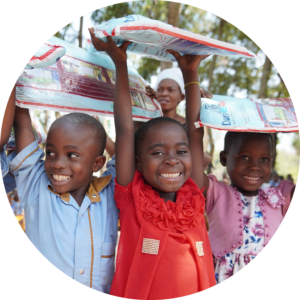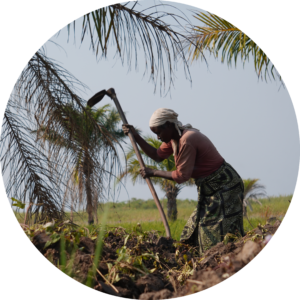ICCM, FMCUSA
Every Child: Loved, Safe, and Developing

Democratic Republic of Congo
ICCM operates the start of an intricate social ecosystem in Eastern DRC in order to create sustainable, self-sufficient programs that address 3 critical needs: Education, Healthcare, and Nutrition. The system involves a combination of medical partners, local business, and schools. Many pieces of the project are in place, actively serving hundreds of children and families. Designs are also in the works to soon realize the full potential of ICCM’s school, alumni, and partners in the region.

Systemic Poverty is a Barrier to Development
DRC is among the five poorest nations in the world. About 75% of Congolese people lived on less than $2.15 a day in 2023. Roughly 75% of children attend school, with only 75% of those completing the 8th grade (primary school). For those attending, the quality of education in the DRC is very poor, with 97% of 10-year-olds still unable to read and understand simple text. Many DRC children in poverty also suffer from stunting caused by malnutrition. Stunting describes a child who is under-height-for-age, and the consequences are a lack of both physical and cognitive development, as well as lower survival rates for young children.
*Data courtesy of World Bank & WHO
The Nundu Hospital, near Mboko on Lake Tanganyika, is the only option for medical care for hours in any direction. Director Dr. Marx manages and educates a staff of dozens to serve at the main campus as well as clinics throughout the area. The system serves a region of 300,000 people, and the hospital’s maternity wing sees 3+ babies born every day. ICCM provides the only daily meal for hospital patients, most of whole are women and children.
Meals for the hundreds of monthly patients are sourced from ICCM’s farm and mill. The Nundu farm provides crops required to produce a nutrient-rich porridge. This “super-food” gives children essential building blocks for physical development. Crops produced from the farm also help sustain ICCM’s animal project, which raises and provides livestock for families. Goats, chickens, pigs, and other animals are extremely valuable, acting as a major source of income and nutrition for local families.
The farm’s produce also provides a daily meal for ICCM’s school in Baraka. The school is a shining example of hope for DRC’s development. Where public schools have classrooms of 100 children, ICCM’s Lynda Stryker Academy caps at 30, with nearly 400 children attending!
Baraka families are very familiar with the impact of the Academy. The city of 200,000 lives with the results of economic and social conflict every day. Road infrastructure along the lake is non-existent, leaving communities like Nundu and Baraka cut off of from reliable access to imports, exports, government and NGO support, and tourism. Baraka has no commercially available electricity, making local business extremely hard to develop. It is in such conditions that ICCM offers hope through a world-class school that develops leaders for its community.
Now What?
We desire to partner with local leaders in Eastern DRC to exponentially expand our impact through a financially generative, self-sustaining process. We are seeking partners and investors to empower these next steps:
UPDATE!
Some of our operations have been impacted by regional conflict. We have found creative methods for continuing to support sponsored children! However, we cannot implement the follwowing major initiatives until it is safe for our leaders and local communities.
EXPAND THE FARM 10x
Expand the Farm 10x
A SECOND MILL
A Second Mill
A NEW SCHOOL
A New School
INVESTMENT IN LOCAL BUSINESS
Investment in Local Business
Scroll Too Far?
Contact
- 317.616.4740
- 800.342.5531 ext. 502
- iccmsocial@fmcusa.org
- PO Box 51710, Indianapolis, IN 46251
- Privacy Policy
Love
The greatest expression of our hope is to love God, which includes loving others; to be part of the healing of brokenness in all its forms, for all people. We love because of Jesus. ICCM is a department of The Free Methodist Church, USA, a registered 501(c)3 non-profit.